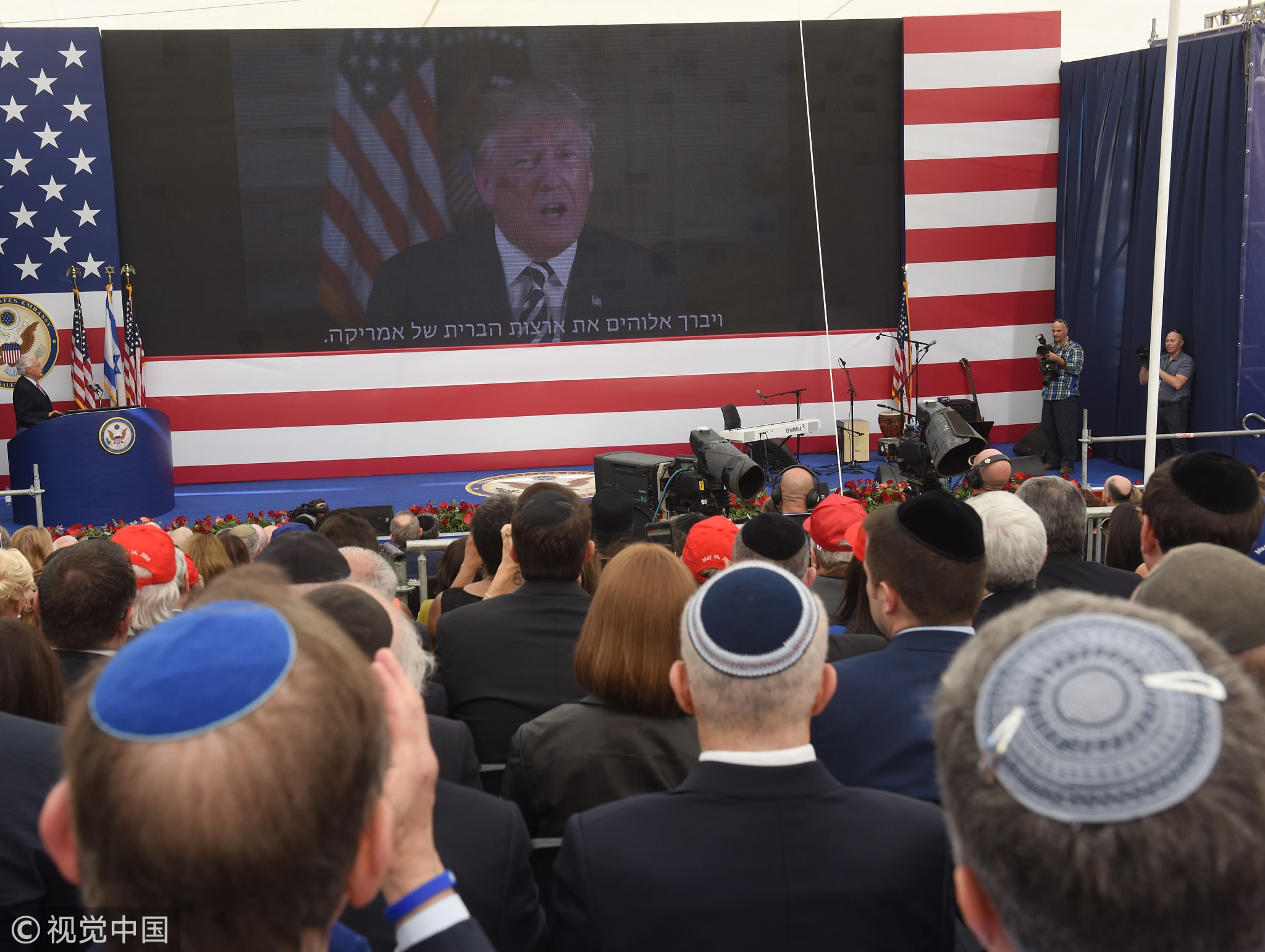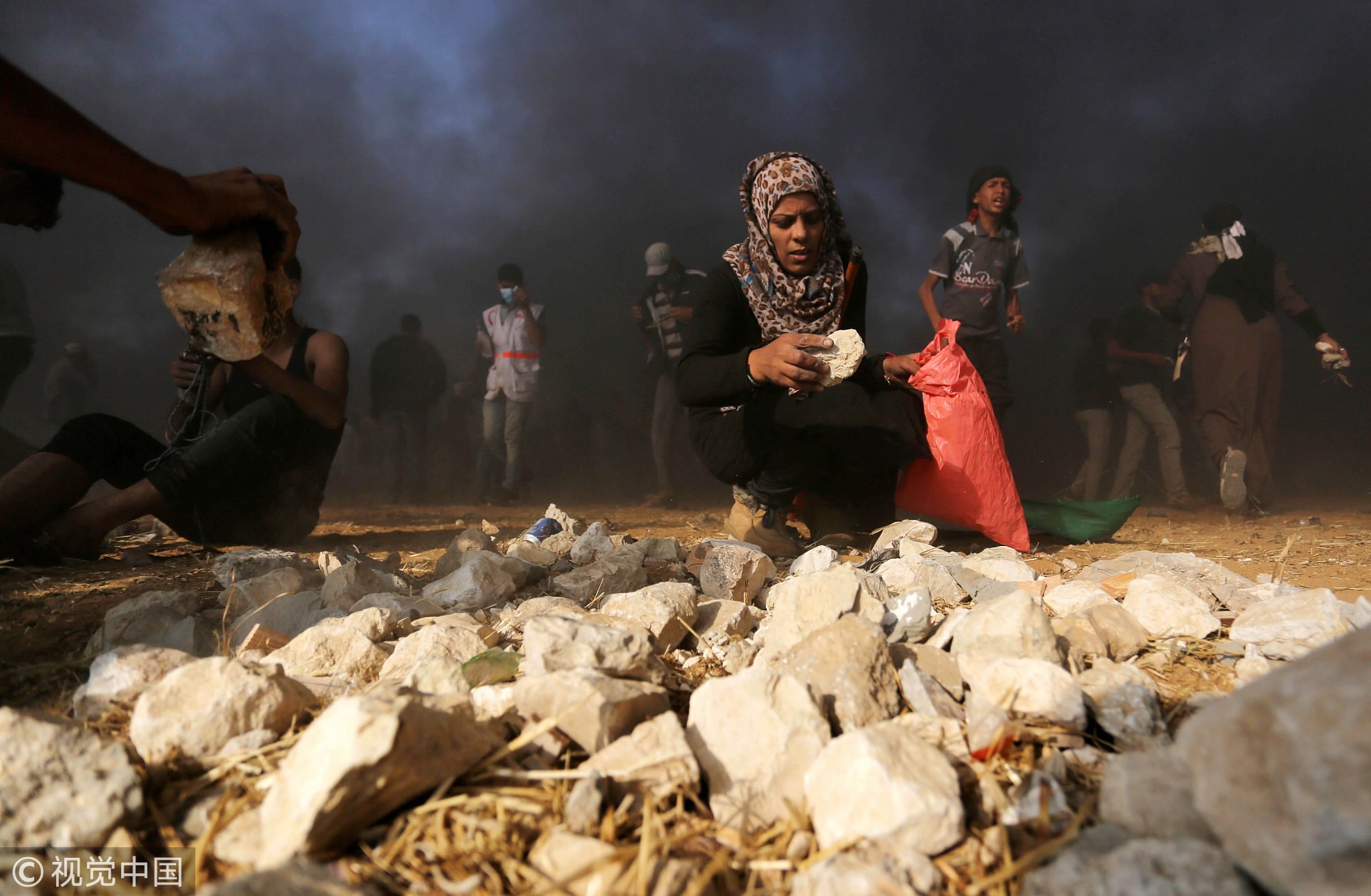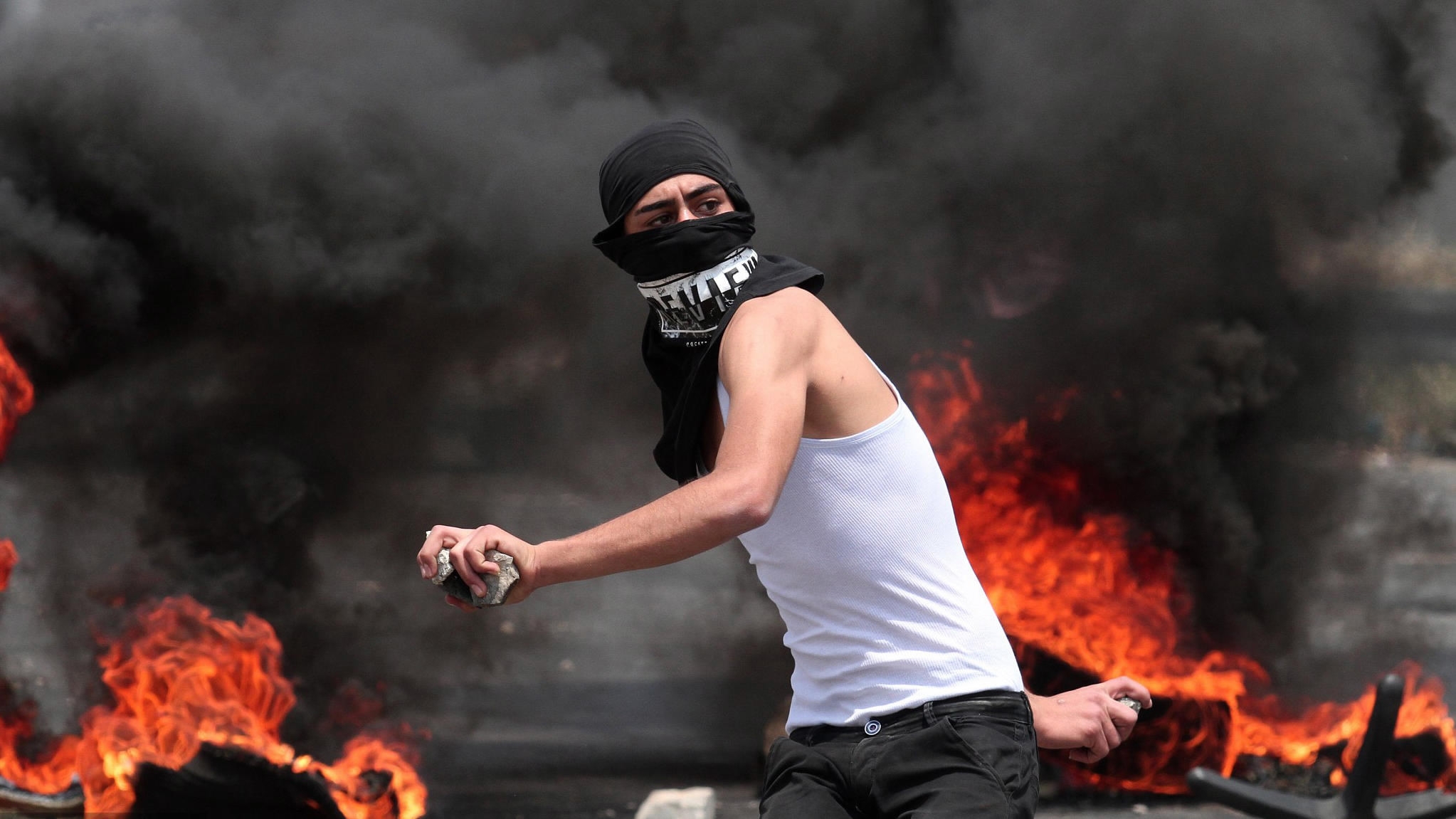President Trump’s decision to break with the decision of the previous administration to put off transferring the US embassy to Jerusalem, which Congress has long supported, has already led to serious violence in the region and could well open up a “Pandora’s Box” of troubles for the president if something is not done quickly.
Demonstrations have been occurring every Friday on the border between Gaza and Israel since he made that decision, and the protests culminated in its most violent day this week with the official opening of the US embassy in Jerusalem.
President Trump, of course, was not the only US president to reaffirm that – at some point in time – the US would open its Israeli embassy in Jerusalem, which both Israelis and the Palestinians claim as their capital.

US President Donald Trump delivers a recorded message at the dedication ceremony of the American embassy in Jerusalem, May 14, 2018. /VCG Photo.
US President Donald Trump delivers a recorded message at the dedication ceremony of the American embassy in Jerusalem, May 14, 2018. /VCG Photo.
The US Congress in 1995 had already passed a resolution calling for the relocation, a prerequisite for the “two-state solution” to the Israel-Palestine conflict. However, that meant a divided Jerusalem would serve as capital for both Israel and a new Palestinian state, something that Prime Minister Netanyahu has never accepted.
Maintaining the US embassy in Tel Aviv, and not Jerusalem, was a way of preventing this issue being decided short of an overall peace agreement between the Israelis and the Palestinians. But President Trump took that dangerous step, and this has placed the very possibility of a peaceful settlement of the Israeli-Palestinian conflict in question.
The decision is, of course, popular with many of the President’s constituents within the Christian evangelical movement. It may also help Prime Minister Benjamin Netanyahu come out from under the numerous scandals he is embroiled in.

A Palestinian protester reacts from tear gas during clashes with Israeli security forces in a tent city protest on the occasion of the 70th anniversary of the "Nakba," and against the US embassy move to Jerusalem, at the Israel-Gaza border, May 15, 2018. /VCG Photo.
A Palestinian protester reacts from tear gas during clashes with Israeli security forces in a tent city protest on the occasion of the 70th anniversary of the "Nakba," and against the US embassy move to Jerusalem, at the Israel-Gaza border, May 15, 2018. /VCG Photo.
And while the Saudis have issued a pro forma protest against the Israeli violence, they remain mum on the US decision to move its embassy to Jerusalem, not wanting to upset the Trump administration, which has looked the other way in the face of their own aggressive war in Yemen and at their attempts to establish themselves as a hegemonic force in the region.
But the Arab League, Egypt and other Arab countries have spoken out and roundly condemned both the recent Israeli violence against the Palestinian demonstrators and the US decision to move its embassy.
While the US president might pride himself on meeting the campaign pledge of moving the embassy to Jerusalem, he has made it even more difficult to realize another pledge – to create peace between Israel and Palestine. With one of his appointed persons on Mideast peace, his son-in-law Jared Kushner, being one of the main speakers at the embassy opening, it will be veritably impossible for him to serve as a credible mediator.

Palestinian protesters gather during clashes with Israeli security forces in a tent city protest on the occasion of the 70th anniversary of the "Nakba," and against US embassy move to Jerusalem at the Israel-Gaza border, May 15, 2018. /VCG Photo.
Palestinian protesters gather during clashes with Israeli security forces in a tent city protest on the occasion of the 70th anniversary of the "Nakba," and against US embassy move to Jerusalem at the Israel-Gaza border, May 15, 2018. /VCG Photo.
It may be that President Trump has been convinced by Netanyahu that he will keep the Palestinian situation “under control,” probably in another example of a Palestinian “Bantustan” under Israeli guardianship. But this will only serve to provoke more violence and will not be a satisfactory solution to the international community, which has long supported a two-state solution to the Israeli-Palestinian problem.
In addition, the overreaction of Israeli troops during the last few days of tumult on the border with Gaza has resulted in dozens of protesters killed by Israeli bullets and thousands injured. The action has been condemned across the board by the international community and the Arab world.
And the euphoria manifested by the Israeli prime minister over the US decision may very well lead him to become even more aggressive and do something that will spark a new Mideast war.

Palestinian protesters gather during clashes with Israeli security forces in a tent city protest on the occasion of the 70th anniversary of the "Nakba," and against the US embassy move to Jerusalem at the Israel-Gaza border, May 15, 2018. /VCG Photo
Palestinian protesters gather during clashes with Israeli security forces in a tent city protest on the occasion of the 70th anniversary of the "Nakba," and against the US embassy move to Jerusalem at the Israel-Gaza border, May 15, 2018. /VCG Photo
While President Trump can congratulate himself on the motion that has been created toward a peaceful solution on the Korean Peninsula, if war results in the Middle East as a result of the foolish decision to move the US embassy, this could become the “Achilles heel” for his administration, which President Trump’s enemies at home and abroad will not be remiss in using it against him.
It is time for the other countries and the UN to take a more assertive role in the region to provide that leverage that is needed to avoid a new Middle East war. And maybe President Trump will finally have that meeting which he has talked about with President Putin to discuss not only Syria, but the overall situation in the region. Perhaps then, cooler heads might prevail.
(William Jones is the Washington Bureau Chief for the Executive Intelligence Review and a non-resident senior fellow of Chongyang Institute for Financial Studies, Renmin University of China. The article reflects the author’s opinion, and not necessarily the views of CGTN.)






